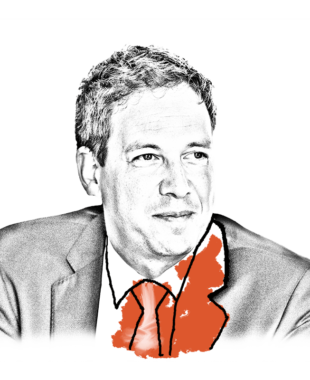The journey to a carbon-neutral economy Alan Lander, Head of Research , Tom Miedema, Investment Manager
Climate and carbon are themes set to define the investment landscape for generations to come. As long-term investors, how do we ensure that portfolios are best positioned to benefit in this lower-carbon world?
On 20 January 2021, President Joe Biden sat at the Oval Office’s Resolute desk for the first time and signed an executive order returning the US to the Paris agreement on climate change. As a result, all of the world’s top emitters of greenhouse gases will now sit around the table at the UN Climate Change Conference, COP26, in Glasgow this November. Expectations are high. The pressure will be on for countries around the world to commit to more aggressive emissions reduction plans, doubling-down on the ambitions of that landmark Paris accord.
For some, the commitments made in November won’t go far enough. Others will question whether the cost of achieving decarbonisation will justify the benefits. Either way, there is no denying the growing international momentum behind decarbonisation, a trend that is reshaping not just the global energy industry, but the global economy more generally.
Whilst momentum for change may have intensified, the issues of climate change are not new. At Walter Scott, we have long considered its impact on the companies in which we invest. Emissions-intensive businesses are scrutinised by our Research team in order to understand their sustainability in a world seeking to limit global temperature rises. But, with climate action set only to intensify over our investment horizon, climate change must be an increasingly important point of consideration for each and every investment.
It was in this context that, in 2019, the Research team embarked on an in-depth research initiative with the goal of building on our collective knowledge in this area, in particular the strategies and technologies that will shape the transition to a lower carbon economy in the coming decades.
Timeline
Expert, Engagement, Research, Site Visits, Discussion, Training
Over the course of 18 months, a dozen members of the Research team were directly involved in the project, researching different topics and sharing their findings through detailed presentations and discussion with the rest of the team.

We have attempted to summarise this project in a number of articles and short films on our website, hopefully providing a taste of the research that was undertaken and how that work might shape the thinking of the Research team looking forward over the long term.
Uncoupling carbon emissions from economic growth is no easy task. Energy is the fuel that powers economic development. Moreover, cheap and reliable energy (like that provided by carbon-intensive fossil fuels) remains critical in lifting the world’s poorest people out of poverty. Decarbonisation cannot become a barrier to such progress.
Accepting that the world’s population will continue to grow, and that all of its inhabitants should have the opportunity to improve their economic fate over time, how does the world become less carbon intensive? To do so and to generate more energy with less emissions, we believe there are three major levers that the world has to pull.
The first is to reduce the energy intensity of economic activity. This has already been happening slowly as new technologies have been developed that reduce the energy required to produce one unit of output. The increasing component of services within global GDP also aids this trend. On the one hand, it is as simple as adopting LED lighting technologies in buildings globally. On the other hand, it involves a root-and-branch redesign of the way we make, use and waste products through a shift towards the concepts of a circular economy.
Second, the energy we use needs to become less carbon intensive. Global energy supply is no less reliant on carbon today than it was 20 years ago. Improvements in the energy mix that have been achieved in the developed world have largely been offset by growth in less developed economies powered by emission-heavy energy sources. Electrification will be the key enabler in this area, with growth in renewable generation underpinning its carbon credentials. However, a suite of other solutions will also be critical including gas switching, battery storage, electric vehicles, the development of a hydrogen economy and even revisiting the debate around nuclear power.
The final lever is carbon removal. If the goals of the Paris agreement are to be achieved, carbon removal will be big business come the middle of the century. The requirement for carbon-removal technology is often set in the context of industries with hard-to-abate emissions like steel and cement production or aviation. This is true, but in reality the prevalence of carbon removal will likely stretch much further than that. The more carbon dioxide that can be cheaply and effectively removed from the atmosphere and stored in a permanent sink, the less the world will rely on other more expensive emissions-reduction technologies. Today, the nascent carbon-removal sector relies on nature-based solutions such as afforestation. However, in time, technical carbon capture and storage are expected to grow alongside the importance of this developing market.
DIRECTION OF TRAVEL
The pace of development in each of these areas will be influenced by the evolution of global carbon taxation regimes. Higher carbon prices are inevitable as governments seek to incentivise emissions reduction and stimulate innovation that will add to their future decarbonisation arsenal.
It is clear that climate and carbon are themes that are set to define the investment landscape for generations to come. All too often, investment-related discussions in this area focus on the risks, identifying those companies with most to lose and then determining whether those risks warrant divestment. Of course, this is a necessary debate (and it is addressed in this analysis of the oil & gas industry) but, for a long-term investor, the significance of the coming energy transition lies in investment, not divestment.
The scale of investment required to decarbonise the global economy over the next 40 years is colossal. From technologies that already have traction from a commercial standpoint, such as renewable power generation, electric vehicles and green building materials, to others that remain in development today, but will ultimately form part of the solution, such as hydrogen and carbon capture and storage. Investment in all of these areas needs to be at scale and at pace. This will undoubtedly create a plethora of investment opportunities in the years ahead. Of course, navigating such an investment environment will not be simple. The returns on investment in new technologies and new industries are far from certain. Many exciting “green” technologies may never achieve the necessary economics to drive commercialisation. For others, commercial adoption may be swiftly followed by commoditisation. As ever, we will focus on the individual businesses.
Careful, rigorous, company analysis will be the tool we use to sift through the hype and hyperbole, to find leading companies with defensible competitive advantages and high levels of return, to complement the tailwind of “green growth”.
PORTFOLIO CONTEXT
What is clear today is that, in order for a company to deliver long-term growth and sustainably high levels of profitability, it must be relevant in the context of the journey to a carbon-neutral global economy on which the world has now embarked. For this reason, we believe that all companies in the portfolio should be relevant in a global energy system compatible with limiting global warming to 1.5°C1.
The global energy system (or at least a significant part of it) can be viewed as an exhaustive collection of individual company contributions. Each one adds to the system both directly, through consumption and production of energy, but also through its influence on the system as a whole. We believe that system-wide emissions are the most important factor to consider when evaluating a company’s sustainability credentials, not just its direct impact. A company that is contributing to system-wide emissions reduction (net of its direct emissions) can form part of an equation that solves for lower global temperature rise (irrespective of those direct emissions).
For example, as discussed in the article on buildings emissions, Daikin, the Japanese air-conditioning (AC) manufacturer, is an industry leader in the production of energy-efficient AC units. As the global population grows, urbanisation continues and individuals become wealthier, so demand for air conditioning rises. The more of that demand that is satisfied by Daikin’s industry-leading products, rather than the less efficient units offered by its peers, the better the result for system-wide energy efficiency.
Such system-wide influence, reducing energy consumption through the use of highly-efficient AC units, far outweighs any contribution Daikin can make through reducing the emissions it generates manufacturing those products. All that said, it goes without saying that any sustainably managed company should be cognisant of the trajectory of its direct emissions and look to reduce unnecessary environmental impact wherever possible. Indeed, in the case of Daikin, it has made strong progress reducing its direct emissions footprint and has ambitions for further reductions through 2030 and, ultimately, to net zero beyond.
The application of this system-wide framework for the consideration of emissions is well suited to Walter Scott’s company-focused approach to investment. The global energy system is too complex to adopt a one-size-fits-all solution to emissions reduction. Indeed, we strongly believe that any attempt to do so would be counter-productive. Like Ricardo’s theory of comparative advantage, which argues that global output is maximised through specialisation and free trade, so the world is most efficiently decarbonised through allocation of resources to those with a comparative emissions advantage. A blinkered view of emissions at a corporate level risks forgoing such system-wide benefits.
We believe that this pragmatic approach will help us to avoid companies exposed to significant climate risk be that over the short or long term. More importantly, we are assured that this approach will also help us to identify those with the most to gain from the coming energy transition.
- An average global temperature rise of 1.5 degrees Celsius above pre-industrial levels.
Important Information
This article is provided for general information purposes only. The information provided in this article relating to stock examples should not be considered a recommendation to buy or sell any particular security. Any examples discussed are given in the context of the theme being explored. The opinions expressed in this article accurately reflect the views of Walter Scott at this date, and whilst opinions stated are honestly held, no reliance should be placed on them when making investment decisions.







